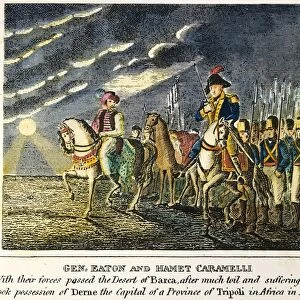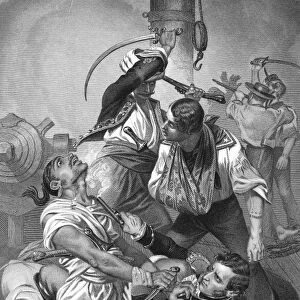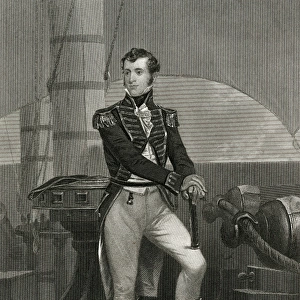TRIPOLITAN WAR, 1804. A wounded American seaman (not Reuben James, in spite of the tattoo) saving American Commodore Stephen Decatur from a scimitar stroke during the Tripolitan War of 1804-1805. Engraving, 19th century
![]()

Wall Art and Photo Gifts from Granger
TRIPOLITAN WAR, 1804. A wounded American seaman (not Reuben James, in spite of the tattoo) saving American Commodore Stephen Decatur from a scimitar stroke during the Tripolitan War of 1804-1805. Engraving, 19th century
Granger holds millions of images spanning more than 25,000 years of world history, from before the Stone Age to the dawn of the Space Age
Media ID 7523990
1804 African Algerian Algiers Attack Barbary Coast Battle Commodore Crew Cutlass Decatur Deck Muslim Pirate Stephen Tripoli Tripolitan War Us Navy War Ship Warfare Scimitar
EDITORS COMMENTS
This 19th-century engraving captures a pivotal moment during the Tripolitan War of 1804-1805. In the midst of a fierce battle, an American seaman, bearing a striking tattoo that sets him apart from Reuben James, fearlessly comes to the aid of American Commodore Stephen Decatur. With swift and heroic action, he intercepts a scimitar stroke aimed at Decatur's life. The image showcases the intensity and chaos of early maritime warfare as it unfolds on the deck of an American warship. The attack by Algerian pirates from Tripoli highlights the dangers faced by American sailors in their fight against Barbary Coast piracy. What makes this scene even more remarkable is that the wounded seaman who saves Decatur's life is African-American. This depiction sheds light on the diverse crew that fought for America's freedom during this historic conflict. The engraving serves as a testament to bravery and unity in times of adversity. It symbolizes not only individual heroism but also collective determination to protect American interests abroad. As we admire this powerful artwork from The Granger Collection, let us remember those who risked everything in defense of their nation and honor their sacrifices made centuries ago.
MADE IN THE USA
Safe Shipping with 30 Day Money Back Guarantee
FREE PERSONALISATION*
We are proud to offer a range of customisation features including Personalised Captions, Color Filters and Picture Zoom Tools
SECURE PAYMENTS
We happily accept a wide range of payment options so you can pay for the things you need in the way that is most convenient for you
* Options may vary by product and licensing agreement. Zoomed Pictures can be adjusted in the Cart.





